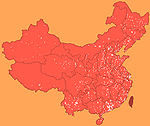Thankfully, that continues to change.
First, to clarify, Laogai (Chinese: 勞改; pinyin: láo gǎi), is apparently an abbreviation for Láodòng Gǎizào (勞動改造), which means "reform through labor," and is a slogan of the so-called Chinese criminal justice system. Laogai must however be distinguished from laojiao, or re-education through labor, which is administrative detention for a person who is not a criminal but has committed minor offenses, and is intended to reform offenders into law-abiding citizens.
The Laogai Research Foundation, whose offices are located in Washington, D.C., is in the process of making its archives available to the public via The Laogai Museum at the same address.
Why?
As it is written on the Foundation's website:
"Due to the suppression of free speech within China, much of the material housed within the Laogai Archives is not available to researchers in mainland China. Thus, the Laogai Archives are in a unique position to support academics, journalists, students, and activists in freely conducting research on human rights in China."
Not Walmart Locations
With China, of course, nothing is ever as it seems on the surface; even when the surface one is viewing is quite obviously vast and wide.
Hence, the The Laogai Research Foundation delves into more than mere horrors of a reform/re-education camp system, including some of the other tools utilized by the Chinese Communist Party to control the people of the world's most populated nation.
These tools include the "One Child Policy," organ harvesting (in conjunction with) the death penalty, as well as the recurring challenge of internet freedom.
Harry Wu, truculent and direct, for more than 20 years now, remains in that certain forefront, still trying to prick or awaken the conscience of the West.
Recently, during an interview with The Irish Times, in the context of the West's seemingly insatiable desire for heroes, Harry Wu stated that he was definitely not a hero. "A hero would have killed himself a long time ago."

No comments:
Post a Comment